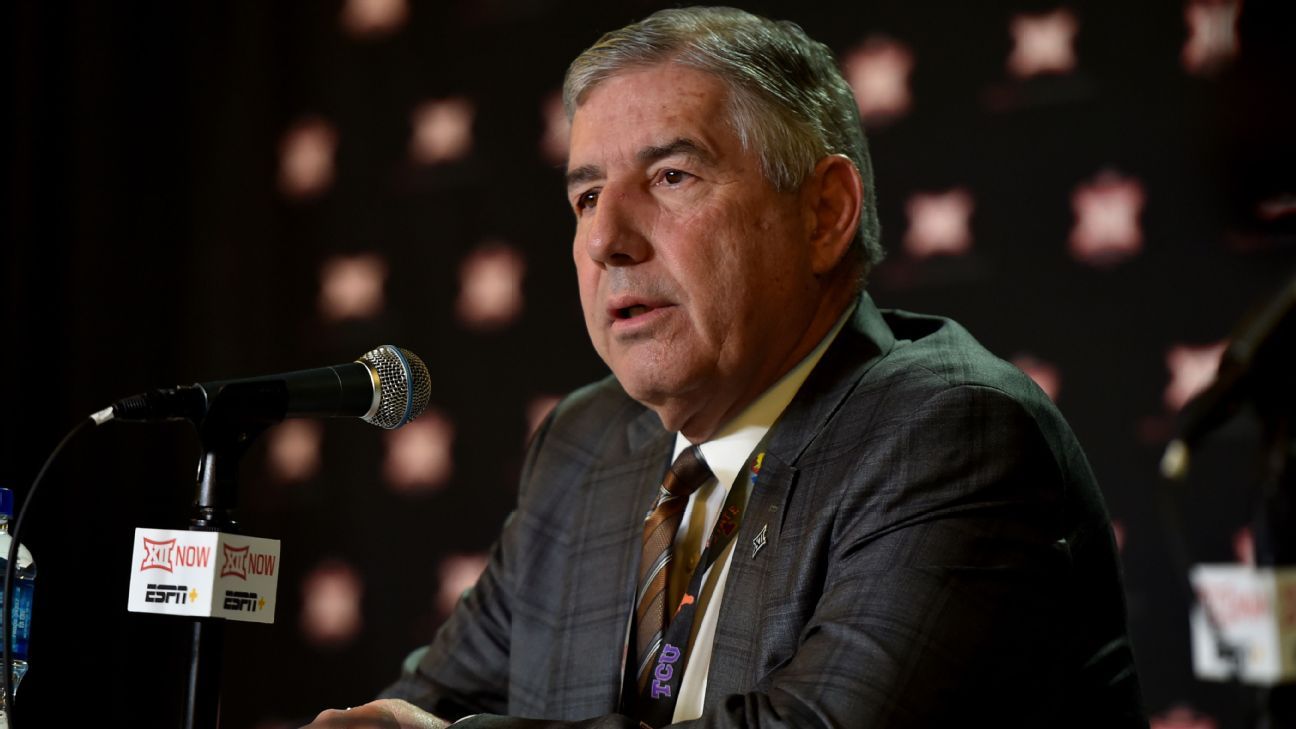Big 12 commissioner Bob Bowlsby said Thursday that he’s optimistic about college football starting on time or close to it, but is skeptical of being able to go through the entire season without disruption because of the coronavirus pandemic.
Bowlsby, in a 28-minute interview on SiriusXM Big 12 radio, discussed his concerns, potential scenarios and the adjustments schools need to make to play the season. Among his top concerns is whether it’s possible to make it all the way to the College Football Playoff without having to stop the season.
“I worry more about the end of the season and the postseason than I do the beginning parts of the season,” Bowlsby said. “If the virus comes roaring back in the traditional flu and virus season in November, December, through March, I wonder if we’re going to get basketball seasons in, I wonder if we’re going to get the [College Football Playoff] in, I wonder if we’re going to get the NCAA tournament in.”
Bowlsby said he thinks “we will be very, very lucky to start on Labor Day weekend and get through a football season without disruptions.
“We will be very lucky to get through the postseason and the basketball season without disruptions.”
Bowlsby told The Athletic on April 23 that a “split season” with some games happening in the fall and some happening in the spring is a model that conference commissioners are evaluating, but clarified on Thursday that it’s a “fallback position.” He said he’s not an advocate for that model, but “we may find ourselves falling back.”
He said that he believed that with warmer weather on the horizon, “I think we’ll get back to campus and get back to practicing and we’ll start the season. We may not start exactly on time, but I think we’ll start the season.”
What games look like and how many fans attend is also a topic Bowlsby discussed.
“It’s hard to put 100,000 people in a stadium when you’ve got to sit 6 feet apart,” he said. “Does a 100,000-seat stadium become a 25,000-seat stadium?”
He also mentioned the annual Red River Showdown game between Oklahoma and Texas, which takes place at the Cotton Bowl in Dallas in the middle of the State Fair of Texas. Last year, the state fair hosted 2.5 million people over a three-week span.
“When you think about a petri dish for spreading infection can you think of one that’s better than the State Fair of Texas?” Bowlsby said. “I mean, people are jammed in there and they’re enthusiastic and it’s about a perfect place to transmit any kind of an infection.
“In this new normal … how do you have that at the Cotton Bowl when you’ve got to walk through 300,000 people gathered out in the outer reaches? It’s those kinds of things that we’re going to have think ourselves through.”
With conferences spread across multiple states (the Big 12 has schools in Texas, Oklahoma, Kansas, Iowa and West Virginia), Bowlsby also emphasized the need for commissioners to plan for multiple contingencies in the event that one state has an outbreak, which might result in safety measures that apply to one region but not another. If someone on or around a football team is infected, that could also provide some hurdles Bowlsby said officials must plan for now.
“As an example, say somebody at TCU tests positive for the virus and it’s somebody that works regularly with the football team,” Bowlsby said. “West Virginia is scheduled to come in on Saturday and play against them. If West Virginia calls and says they’re not coming because we don’t wanna expose our kids, do they forfeit? Does TCU forfeit? Is it considered no game?
“What happens if we say we’re going to play a nine-game conference schedule and only get seven games in? What happens if some that get eight games and some that only get six games? How do you decide your champion? The number of variables is virtually almost limitless. But those are the kinds of things that we’re working our way through.”
Bowlsby did stress the importance of trying to play at least some of the season, both for “popularity reasons” and for “real, practical reasons,” including the revenue the sport generates. Football is the most profitable sport at most FBS schools.
“We certainly would love to be playing with full stadiums, but given social distancing and some of the things we’ve been through, one has to wonder if the psychology of going back to public assembly isn’t going to change,” Bowlsby said. “Are you gonna want to go into a stadium and sit cheek to jaw with someone you don’t know, after all we’ve been through?”
